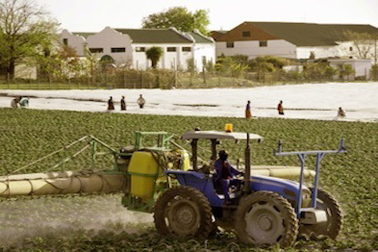 The fumigant methyl iodide has been pulled from sale in the United States by its Japan-based producer. The company announced that the decision to remove the pesticide was made “as part of an internal review of the fumigant and based on its economic viability in the U.S. marketplace.” The chemical is highly toxic and activists have been working to ban its use for years. A spokesperson for the Pesticide Action Network noted that the product removal comes after vocal opposition from farmers and environmentalists, saying: “This decision is born of the tireless work of farmers, farmworkers, rural high school students and mothers who are keeping strawberries safe.” Arysta LifeScience operates in 125 countries around the world and stated that it will continue to “support the use of iodemethane outside of the U.S. where it remains economically viable.” Their methyl iodide product, MIDAS, is registered for use in Mexico, Japan, Morocco, Turkey and New Zealand. Methyl iodide was approved for use in by the U.S. Environmental Protection Agency in 2007 over the objections of scientists who said it was not safe. It is injected into the soil before planting to kill insects, weed seeds, and diseases that may harm plants. Scientists are concerned about the health effects on workers who come in contact with the chemical as well as its potential to pollute groundwater. Methyl iodide was brought into more widespread use after the use of another chemical, methyl bromide, was banned due to its negative effect on the Earth’s ozone layer. While the removal of a toxic chemical from the U.S. market is a victory of sorts, methyl iodide is still being used elsewhere in the world on crops that cross international borders. Another concern is what will be used in its place. As always, there are no easy answers or simple victories for farm workers, watchdog organizations, or the consumer. Courtesy of http://www.care2.com
The fumigant methyl iodide has been pulled from sale in the United States by its Japan-based producer. The company announced that the decision to remove the pesticide was made “as part of an internal review of the fumigant and based on its economic viability in the U.S. marketplace.” The chemical is highly toxic and activists have been working to ban its use for years. A spokesperson for the Pesticide Action Network noted that the product removal comes after vocal opposition from farmers and environmentalists, saying: “This decision is born of the tireless work of farmers, farmworkers, rural high school students and mothers who are keeping strawberries safe.” Arysta LifeScience operates in 125 countries around the world and stated that it will continue to “support the use of iodemethane outside of the U.S. where it remains economically viable.” Their methyl iodide product, MIDAS, is registered for use in Mexico, Japan, Morocco, Turkey and New Zealand. Methyl iodide was approved for use in by the U.S. Environmental Protection Agency in 2007 over the objections of scientists who said it was not safe. It is injected into the soil before planting to kill insects, weed seeds, and diseases that may harm plants. Scientists are concerned about the health effects on workers who come in contact with the chemical as well as its potential to pollute groundwater. Methyl iodide was brought into more widespread use after the use of another chemical, methyl bromide, was banned due to its negative effect on the Earth’s ozone layer. While the removal of a toxic chemical from the U.S. market is a victory of sorts, methyl iodide is still being used elsewhere in the world on crops that cross international borders. Another concern is what will be used in its place. As always, there are no easy answers or simple victories for farm workers, watchdog organizations, or the consumer. Courtesy of http://www.care2.com
Fumigant Methyl Iodide Pulled From Sale in the United States

